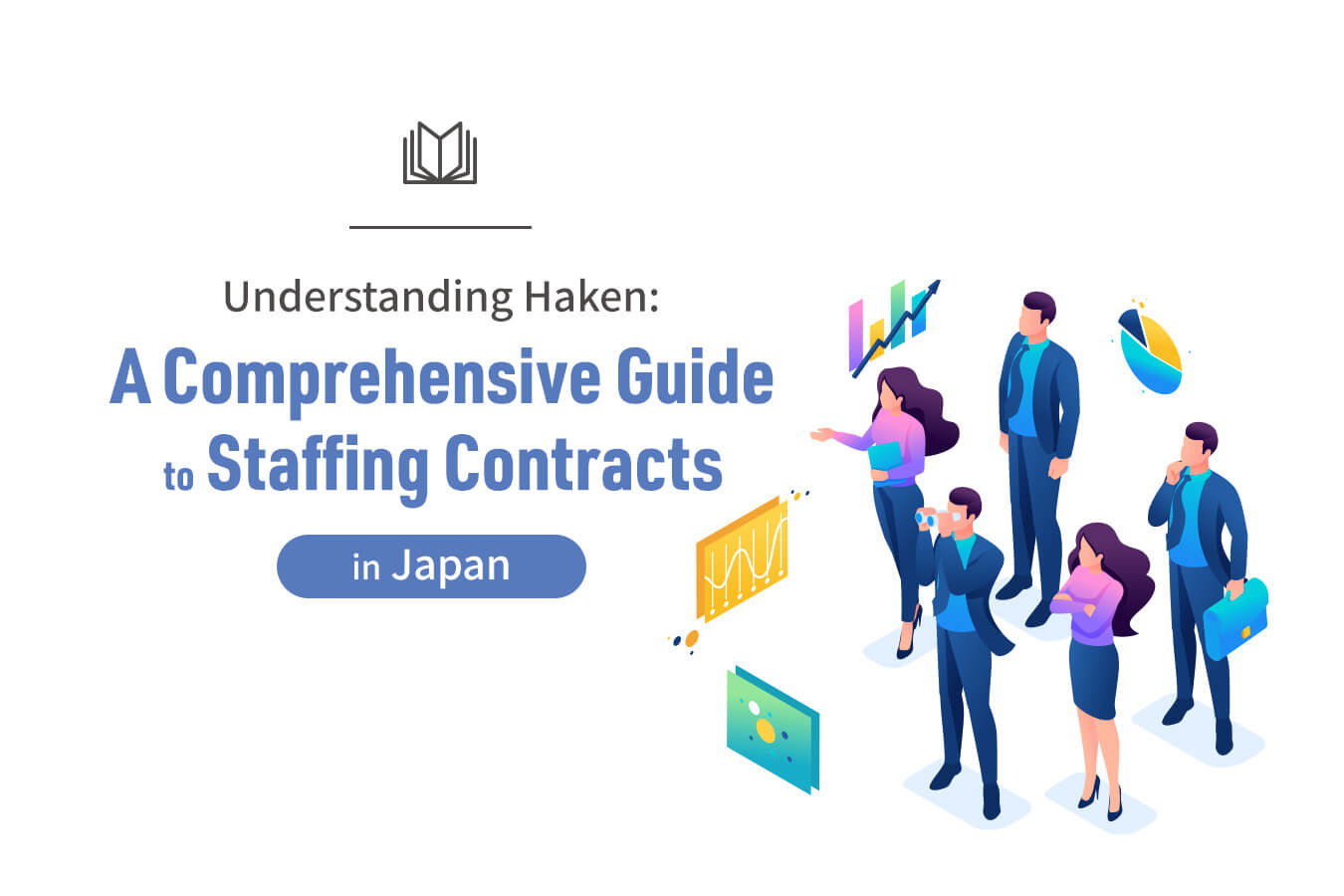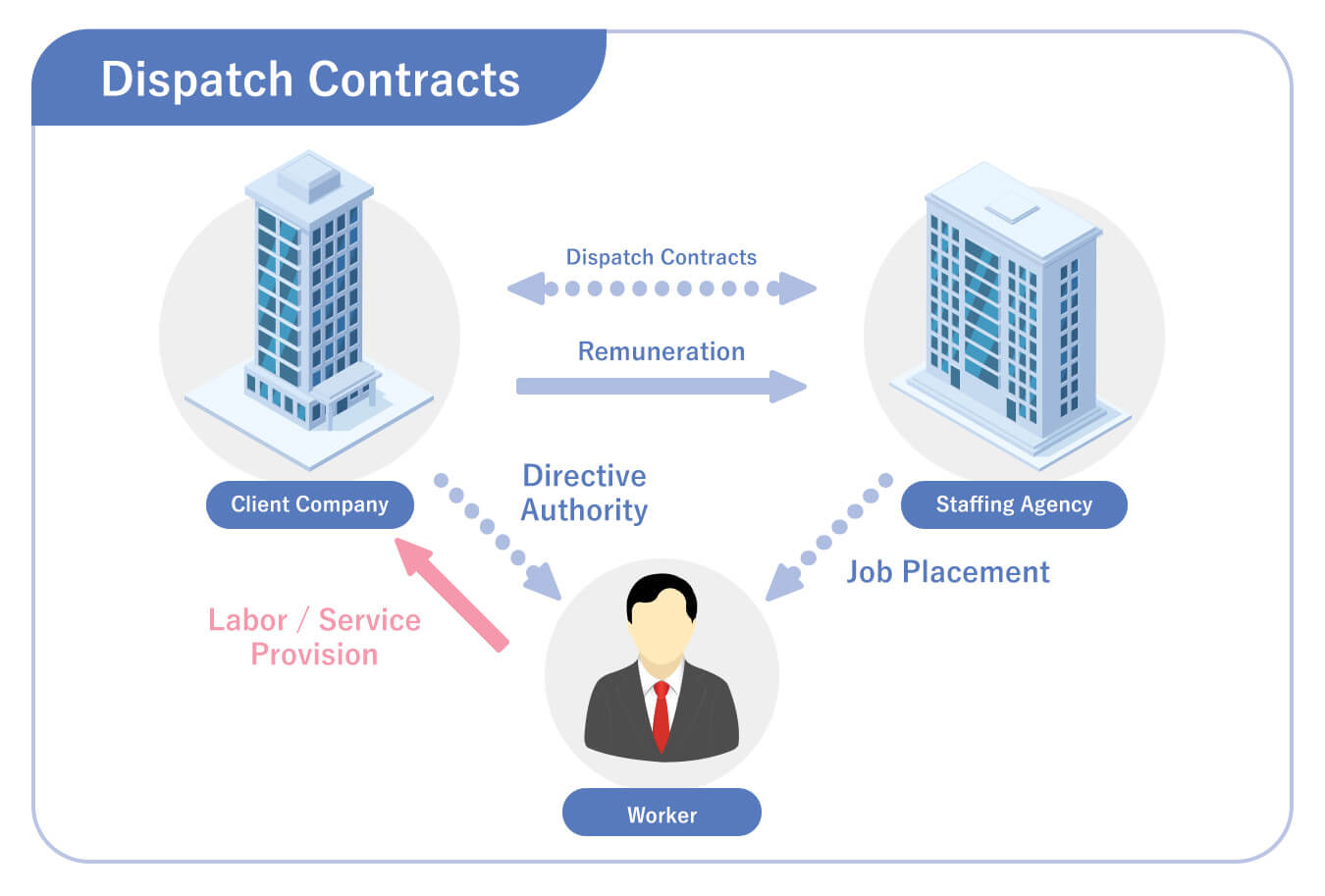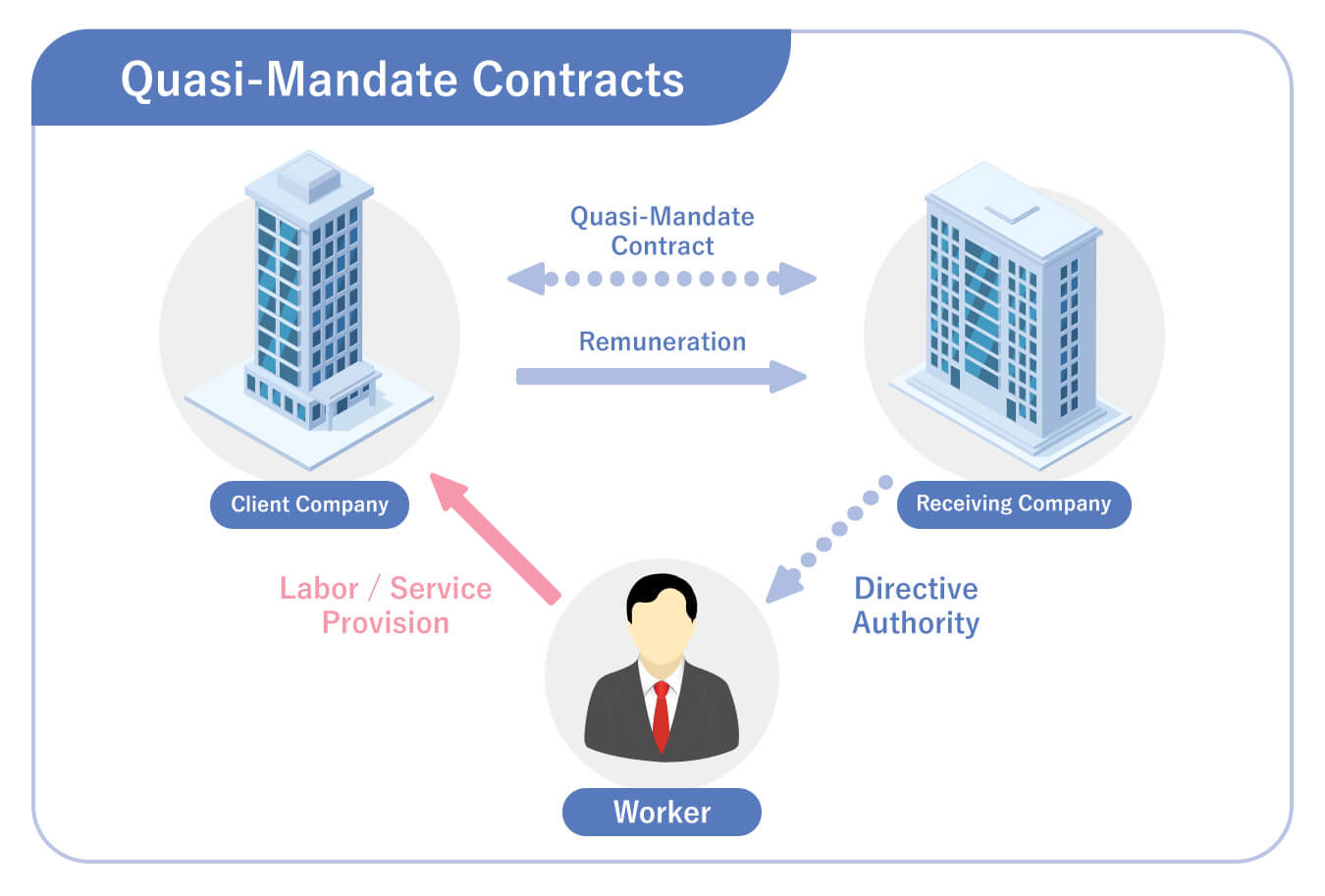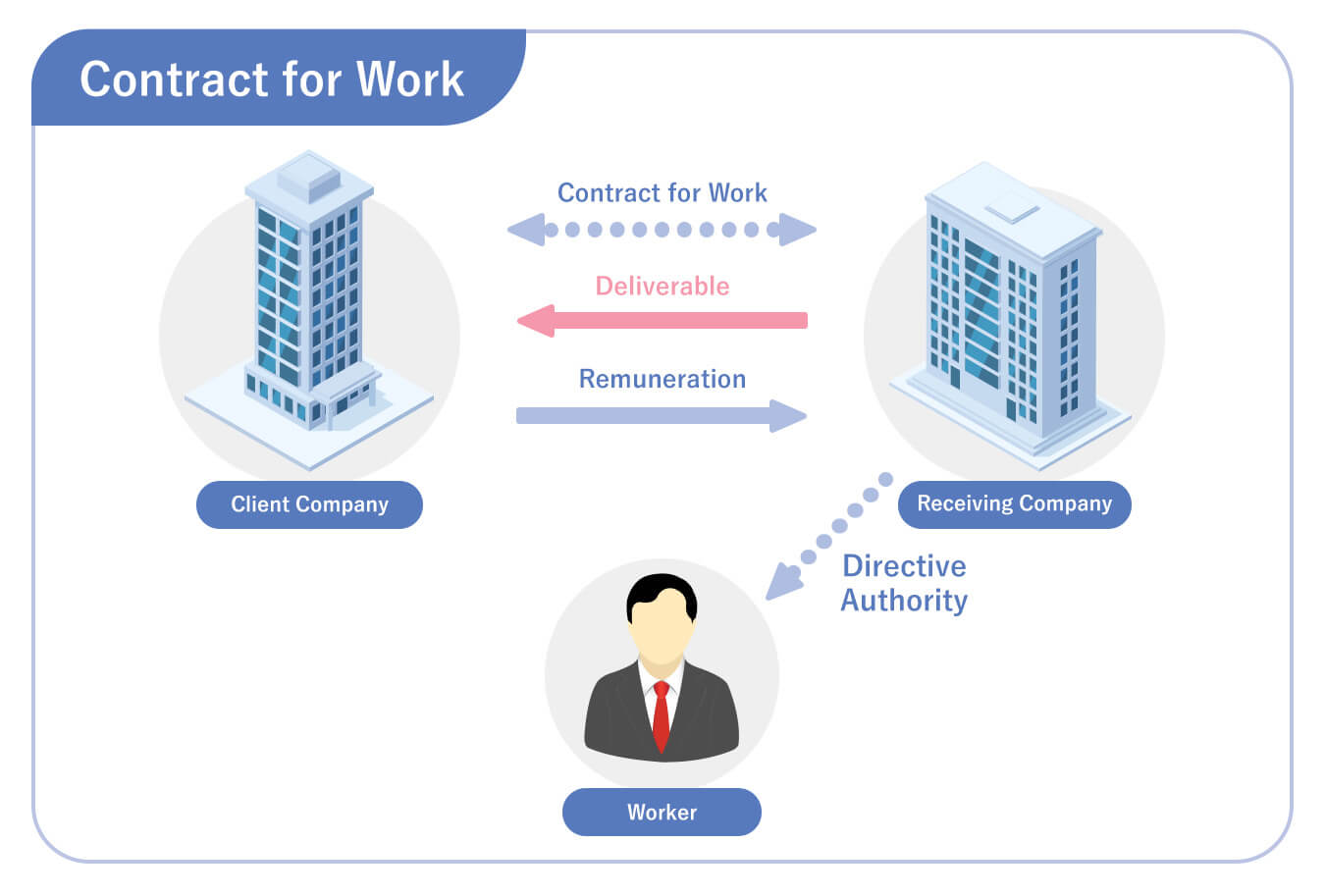A Comprehensive Guide to Staffing Contracts in Japan
July 25, 2024

When companies urgently need an extra pair of hands, most turn to staffing services either as a stopgap measure or as a longer term solution.
Every country has a different system of laws and regulations that govern temporary staffing and other forms of employment. They also often have a different set of terms to talk about these. Japan is no exception, and here temporary staffing is referred to as “haken”, which is generally translated as worker dispatch and the temporary workers who are sent to a client’s office to work are dispatch staff or workers.
When companies then look into the legal side of hiring dispatch workers, they are confronted with the Worker Dispatch Law, and terms such as Quasi-Mandate Contracts, Dispatch Contracts, and Contracts for Work. Many, especially foreign companies, feel lost figuring out the differences between contract types and understanding which suits their business model.
In this article, we’ll demystify “Dispatch Contracts,” “Quasi-Mandate Contracts,” and “Contracts for Work,” explaining the key differences along with their advantages and disadvantages.
By choosing a contract that aligns with your business and company goals, you can reduce labor costs and recruitment costs, while at the same time freeing up your internal resources to focus on high-priority work, significantly boosting your operational efficiency.
If you are considering using staffing services in Japan, this article is for you.
Table of Contents
1. What is the Worker Dispatch Law?
The formal name of the Worker Dispatch Law is “Act for Securing the Proper Operation of Worker Dispatching Undertakings and Improved Working Conditions for Dispatched Workers.”
It was established to ensure that the worker dispatch business services provided by staffing agencies are operated appropriately and to protect the rights of dispatched workers.
The law ensures that dispatched workers can work under proper conditions without being treated unfairly and stipulates working conditions, the duration of labor, the responsibilities of the companies involved, the treatment at the host companies, and the directives for work.
For the English translation of this law, please refer here.
2. Dispatch Contracts
A dispatch contract is a type of contract where a staffing agency employs workers and sends them to work at other companies. This is in accordance with the aforementioned Worker Dispatch Law.The staffing agency employs the workers and facilitates their placement.

There are three types of dispatch contracts:
- Fixed-term Dispatch:
This is a method where a staffing agency enters into an employment contract with a worker and dispatches them to a company. There is a maximum period of three years. This is the most common form of staffing. - Indefinite-term Dispatch:
This is a method where the staffing agency has an indefinite-term employment contract with the worker and dispatches them to a company. There is no fixed period to this type of employment. - Temp-to-Perm Dispatch:
The client company accepts dispatched workers with the intention of direct employment. After the dispatch period ends, if both parties agree, a direct employment contract is signed.
2-1. Advantages and Disadvantages of Dispatch Contracts
Advantages:
- Quick and Flexible Staff Acquisition:
Using dispatch workers can be the quickest and easiest way to secure staff quickly in the event of a sudden departure, when employees need to take long-term leave, or during peak periods when the regular workforce becomes stretched. By specifying the required skills and service period to the staffing agency, companies can skip the cumbersome recruitment processes and hire talent immediately. - Access to Specialized Knowledge:
Projects requiring specialized knowledge or skills that internal resources do not possess can be covered utilizing dispatch services. - Reduced Labor Management Burden:
Using dispatch services can cut a company’s administrative burden, since staffing agencies handle payroll, social insurance procedures, benefit management, and other HR processes. - Minimized Employment Risks:
When companies opt for temp-to-perm dispatch services, they get the advantage of knowing the staff they are taking on permanently. This is because those staff have been working as temps in the companies, allowing the management to assess their skills and performance, and judge whether they will be a good fit before switching to direct employment.
Disadvantages:
- Service Costs:
Filling roles requiring high-skilled or specialized staff can result in significant service fees. Limiting the scope of work assigned to dispatch employees can help reduce these costs. - Short-term Relationships:
Dispatch contracts are generally fixed-term, leading to lower loyalty to the host company compared with that of regular employees. Providing regular feedback and establishing a system to integrate dispatch employees into the host company’s team can help increase their sense of belonging and bolster loyalty.
3. Quasi-Mandate Contracts
A quasi-mandate contract involves delegating specific tasks or processes to a service provider. These processes are outside of legally required processes such as completing tax returns or reporting on legal compliance to regulators which are governed by a “Mandate Contract”.
These contracts are suitable for long-term projects such as the implementation of help desk operations, server/network monitoring, or IT department outsourcing. Payment for these services is based on the performance and progress of the work, not the final result.

3-1. Advantages and Disadvantages of Quasi-Mandate Contracts
Advantages:
- Flexible Contract Periods:
Quasi-mandate contracts have no fixed duration, allowing companies to secure personnel only for the period they are needed. - Flexible Task Allocation:
Unlike deliverable-based contracts, quasi-mandate contracts allow for changes in the tasks delegated to the worker during the contract period. - Expert Task Delegation:
Specialists can be secured for work requiring specific knowledge or skills. - Cost Efficiency and Expertise:
Hiring specialists for specific periods can save costs while ensuring high-quality outcomes.
Disadvantages:
- Short-term Relationships:
As these contracts are for specific tasks, once the task is completed, the contract ends, hindering long-term knowledge retention and relationship building. - Instructional Restrictions:
Companies cannot directly instruct workers, which may result in a lack of flexibility and projects not progressing as planned. - Not suitable for Deadline-driven Work:
As these contracts do not bind workers to complete the work by a specific deadline, they are unsuitable for time-sensitive projects.
4. Contracts for Work
With a contract for work companies outsource the completion of specific deliverables or services. This contract type means that the service provider is accountable for the finished product.
Example projects include software development, website construction, construction projects, and event planning and execution.
The service provider is paid upon completion and delivery of the finished product and is usually responsible for post-delivery fixes and costs incurred by the client if there are issues with the deliverable.

4-1. Advantages and Disadvantages of Contract for Work
Advantages:
- No Labor Management Burden:
The service provider handles the workforce, freeing the client from management responsibilities. - Reduced Operational Burden and Costs:
Payment is only for the final product, avoiding additional costs. - Education Cost Savings:
Utilizing professionals negates the need for client-side training and education. - Objective Work Analysis:
External providers can offer an objective view, highlighting inefficiencies and suggesting improvements.
Disadvantages:
- Risk of Deliverables Not Meeting Expectations:
The client cannot directly manage the work, which can result in quality and functionality issues. - No Knowledge Retention:
As external providers handle the work, internal knowledge accumulation is limited. Including regular reporting in the contract can help share process knowledge internally. - Potential for High Costs:
Hiring highly-skilled professionals can be costly. Long-term contracts may be more expensive than using internal resources. - Quality Control Challenges:
Variability in the quality of work can be an issue. Setting clear quality standards and regular reviews in the contract can mitigate this risk.
5. Comparison of Contract Types
5-1. Differences between Dispatch Contracts and Quasi-Mandate Contracts
The primary difference is the chain of command.
- Dispatch Contracts:
The host company gives direct instructions to the dispatch workers. Workers are under the management of the host company, making it easier to control work content and schedules. - Quasi-Mandate Contracts:
The service provider gives instructions. They manage the work at their discretion, allowing for flexibility in planning and executing tasks.
5-2. Differences between Dispatch and Contract for Work
The main difference lies in responsibility and deliverables.
- Dispatch Contracts:
The host company directs the workers and is responsible for the final deliverables. - Contract for Work:
The service provider is entirely responsible for the deliverables. The host company receives the final product without managing the process.
5-3. Differences between Quasi-Mandate and Contract for Work
The key difference is the responsibility for the deliverables.
- Quasi-Mandate Contracts:
Focus on the process, with payment based on progress. There is flexibility in task allocation and execution. - Contract for Work:
Focus on the final product, with payment upon completion. Suitable for projects where the final deliverables are the primary concern.
6. Conclusion
Each contract type has distinct characteristics that can maximize operational efficiency depending on the nature of each project. Understanding the differences and clearly defining the responsibilities of the client and service provider can ensure a fair contract for both parties and can help you obtain the most suitable outsourcing service for your needs.
By outsourcing tasks in a manner best suited to your company, you can allocate your employees to more critical tasks, reaping numerous benefits from outsourcing.
For Reliable and Experienced IT Infrastructure Staffing, Choose ISFNET
With over 20 years of specialized experience and partnerships with more than 2,000 companies across Japan, we offer comprehensive solutions from proposal to contract conclusion and post-implementation support, all in English.
- Remote Support from Japan to Overseas: Global Offshore Solutions
- On-site Support in Japan: On-site Services
Official Links for Further Information
For detailed information on the Worker Dispatch Law, please refer to the following link:
This link provides official guidelines related to staffing contracts and labor laws in Japan.
Return to the page of Managed Service of the bilingual help desk and onsite | ISF NET, INC.